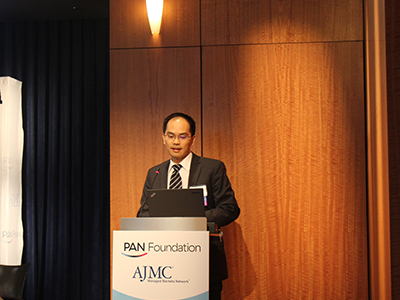PAN challenge winner spotlight: Interview with Kai Yeung

Dr. Kai Yeung is a pharmacist and scientist at Group Health Research Institute, with expertise in pharmaceutical economics and outcomes research. Dr. Yeung conducts research in applied econometrics, health insurance design and cost-effectiveness analysis. As a postdoctoral fellow at the University of Washington, Dr. Yeung sought to understand payor acceptability of alternative payment models for high-priced curative therapies. Dr. Yeung received his PharmD from the University of Southern California and his PhD in pharmaceutical economics from the Pharmaceutical Outcomes Research & Policy Program at the University of Washington.
Dr. Yeung is winner of the 2016 PAN Challenge “Beyond Charitable Assistance: Sustainable Strategies for Providing Access to Critical Medications,” a collaboration between the PAN Foundation and The American Journal of Managed Care. You can read Dr. Yeung’s full paper, “Impact of a Value-Based Formulary in Three Chronic Disease Cohorts,” published by The American Journal of Managed Care by clicking here.
1. How did the PAN Challenge theme relate to your work and background?
My research is focused on how to drive more value from pharmaceutical care with implications for improving health outcomes, with access being a large component of that, which is the focus of the PAN Challenge. My research examines how to do that from a health system perspective while maintaining financial sustainability of the health plans.
2. During your research, did you uncover anything unexpected?
The unique part of this paper is that we used a method of estimating value for drugs and tiering them within a pharmacy benefit structure. Whereas cost effectiveness is used widely in other countries for estimating the value of drugs, it has never been combined—especially in the U.S. setting—with a U.S. type pharmacy benefit which involves co-payment tiers. This was one of the first reports on how a formulary can incentivize use of drugs based on value.
3. What was the most surprising finding?
The most surprising finding was that by using a value-based approach to pharmacy benefit tiering, we preserved access to medications in certain chronic disease states while potentially reducing those expenditures.
4. Why do you think that PAN’s Challenge and Cost-Sharing Roundtable is an important event in which to participate?
The Roundtable brought together stakeholders from diverse backgrounds and perspectives, including patients and researchers. There was a lot of robust discussion, which highlights how difficult this question of sustainability and enhancing access is, and how much it affects patients in terms of their medication costs and access to specialty pharmaceuticals. As diverse stakeholders, we need to come together and try to come up with novel solutions to address this important issue.
5. Is there anything else that you would like to add?
More broadly in the pharmaceutical sector, we need to move away from focusing on the cost of medication to thinking more about the value that the medications provide to patients and society, and we should appropriately incentivize use of medication according to value.